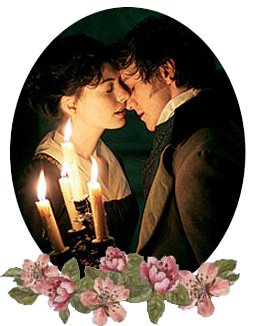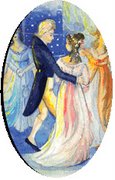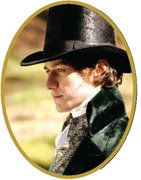Quote of the Week by Linda - Week 38
 While viewing my VHS of Pride and Prejudice with Elizabeth Garvie and David Rintoul recently, Lizzie said something so interesting that I had to look it up to make sure it was really in the book. Sure enough, it was there. The meaning of that one sentence is puzzling and I am hoping someone can shed some light on it.
While viewing my VHS of Pride and Prejudice with Elizabeth Garvie and David Rintoul recently, Lizzie said something so interesting that I had to look it up to make sure it was really in the book. Sure enough, it was there. The meaning of that one sentence is puzzling and I am hoping someone can shed some light on it.
In Chapter 54 Lizzie and Jane are having a sisterly chat – about men, what else? The men in question are Mr. Bingley and Mr. Darcy, of course, and their recent get together at the Bennet home. Here is the quote:
QUOTE
"It has been a very agreeable day," said Miss Bennet to Elizabeth. "The party seemed so well selected, so suitable one with the other. I hope we may often meet again."
"Lizzy, you must not do so. You must not suspect me. It mortifies me. I assure you that I have now learnt to enjoy his conversation as an agreeable and sensible young man, without having a wish beyond it. I am perfectly satisfied, from what his manners now are, that he never had any design of engaging my affection. It is only that he is blessed with greater sweetness of address, and a stronger desire of generally pleasing, than any other man.
"You are very cruel," said her sister; "you will not let me smile, and are provoking me to it every moment."
"How hard it is in some cases to be believed!"
 "And how impossible in others!"
"And how impossible in others!"
"But why should you wish to persuade me that I feel more than I acknowledge?"
"That is a question which I hardly know how to answer. We all love to instruct, though we can teach only what is not worth knowing. Forgive me; and if you persist in indifference, do not make me your confidante."
END OF QUOTE
My problem is with the sentence in bold. I can understand the first part “We all love to instruct”, but what is Jane’s meaning in the second part of the sentence, “though we can teach only what is not worth knowing.” Just what is she trying to tell us? Is she saying we teach nonsense? Surely she doesn’t mean it, or does she? There must be an easy answer, but it eludes me. Thoughts anyone?
Linda the Librarian













































7 comments:
I have to admit, I think that this line is rather pessimistic but we have to face that some aspects of life are. Jane makes such a critical observation, even if it does have a negative stance; in life some things cannot be taught or infact learnt.
It just further enforces her understanding of human nature?
What do you think?
We all love to give our opinions to people to instruct them (or teach), but we really shouldn't. The person who is the recipient is really the best judge and their "own best guide".
Thank you Rachel and Laurel Ann, you have answered my question beautifully. Rachel, I have close relations that are as you say. They cannot be taught or in fact learnt. Precisely.
Laurel Ann, we really shouldn't because the persons above really do think they are "the best judge" however much we think that they may need instruction.
Yrs aff',ly
Linda the Librarian
Im not sure if im wrong here, but maybe Austen meant that what we try to teach is almost always on deaf ears because you cant teach experience, and there isn't a point in advising someone who doesn't understand yet anyways.
:-)
I am very confused by this page. Isn't it Elizabeth who says the line?
Hi.
Thanks for your comment. When referencing Jane we mean Jane Austen, not Jane Bennet. Elizabeth does say the line.
Hope that clarifies.
Thanks for visiting our blog.
Post a Comment